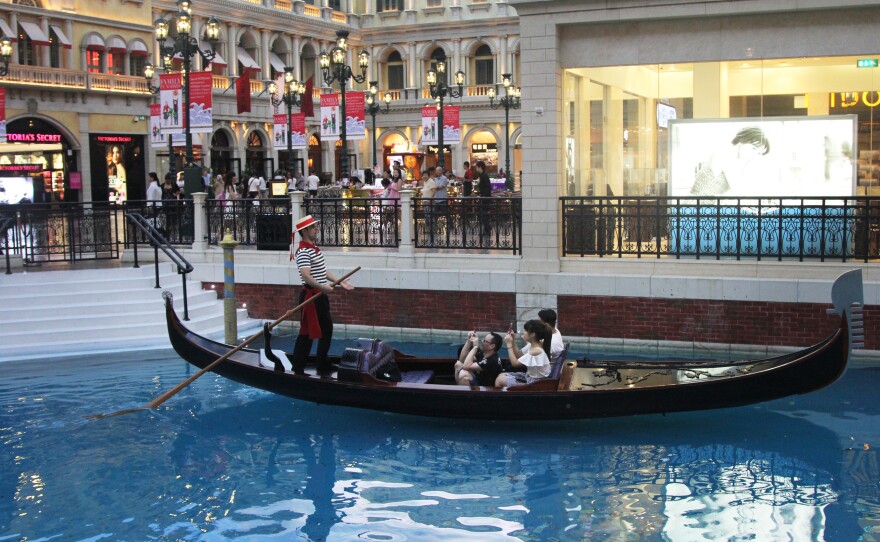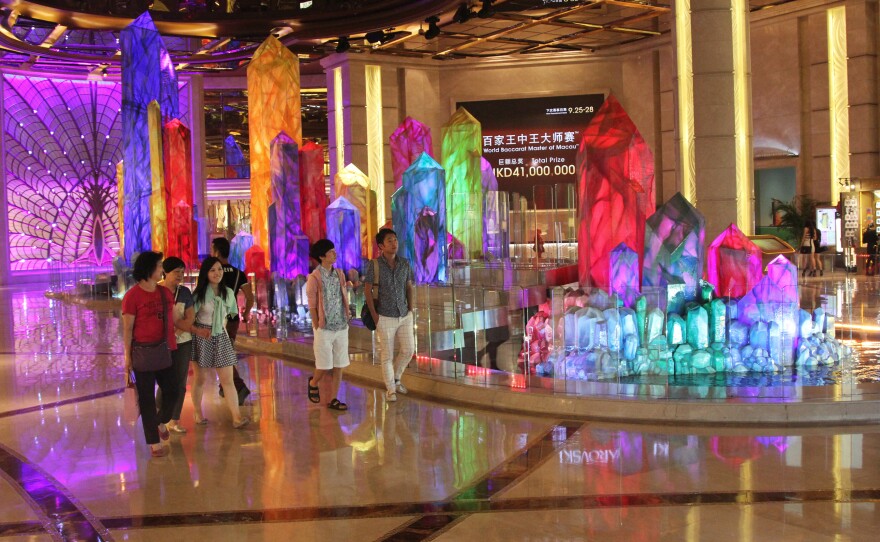

As casinos close in Atlantic City, more are rising halfway around the world in Macau, a Chinese territory on the edge of the South China Sea.
Macau already has 35 casinos, including the Venetian, which features gondoliers from Naples and Florence who belt out "O Sole Mio" along an ersatz canal as Chinese tourists snap pictures. In the next several years, Macau will add more multibillion-dollar gambling resorts modeled on Versailles and Paris.
"The revenue story has been one of phenomenal growth," says Ben Lee, managing partner at iGamix, a gaming management and consulting company.
"We've grown from — to use the old stereotype — a sleepy, shady fishing village to a gaming jurisdiction that is the largest in the world," he says.
Last year, Macau casino revenue grew by nearly 20 percent, hitting $45 billion.
That's nearly seven times the take on the Las Vegas Strip and 15 times the revenue in Atlantic City. Tony Tong, a casino consultant, says that growth has affected everything, including the minimum table bets.
"In the old days, in (2006), '07, I remember there were $20 Hong Kong Baccarat games or $50 Hong Kong Baccarat games," says Tong, referring to minimum bets equivalent to $2.5 to $5.
At most casinos these days, he says, it's more like HK$500 to HK$1,000 per bet — between $60 and nearly $130.
As recently as the 1990s, Macau was still a Portuguese colony and economic backwater. Businessman Stanley Ho had monopoly control of casinos in the city, which is an hour's ferry ride from Hong Kong. Ho's flagship property, the Lisboa, was rundown and depressing.
Macau returned to Chinese control in 1999. The city opened up its gambling market to competition in 2002 and the economy exploded. Major companies like Las Vegas Sands built dazzling hotel-casinos on reclaimed land where, before, there'd been nothing but water. Two of the city's islands were joined and the so-called Cotai Strip was born. Macau's casino districts are now filled with flashing, neon high-rises — a skyline completely unrecognizable from a decade and a half ago.
Macau succeeded by riding China's economic boom, tapping many mainlanders' passion for gambling and their rocketing incomes. Casinos have created tens of thousands of jobs in Macau. Kelvin Leong studied computer programming in college, but earns much more supervising Baccarat tables.
"If I work in computers, I can only earn around $1,500 a month, but now working in casinos, I can earn at least $2,500 a month," says Leong over a breakfast of dim sum. "Actually, computer jobs in Macau are mainly doing maintenance instead of writing programs. And for me, that's not very meaningful."
The casino boom, though, has also brought a staggering rise in housing costs.
Leong, now 32, can't afford his own place and still lives with his parents.
"For example, 10 years ago an old, 400-square-foot apartment cost $25,000," says Leong. "Now, it can be more than $375,000."
Leong adds that less than one-third of his friends own their own apartments.
Larry So, a retired professor at Macau Polytechnic Institute, says the expansion in gambling has changed Macau from a small city where people cared for each other to one where many young people seem consumed by financial status. He cites a former student who planned to become a social worker, but then took a job in a casino.
"Right now, he simply doesn't care about the community," says So. "All he cares about is how much he can make and can he buy himself a better apartment. What will happen to our young people if they follow the same track? What will happen in Macau?"
When So first moved to Macau from Hong Kong 13 years ago, he planned to retire here. But gambling has brought so much traffic, construction and social change, he's now thinking of looking somewhere else.
Copyright 2014 NPR. To see more, visit http://www.npr.org/.






